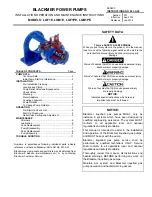
English (GB)
10
7.2 Pressure intensifier
Warning
Pay attention to the orientation of the vent holes, and take care to ensure that the escaping liquid does not cause
personal injury or damage to the motor or other components.
When handling hot or hazardous liquids, special attention should be paid to the risk of personal injury.
When pumping flammable liquids, beware of static discharges. The funnel, for instance, should be earthed!
The seal chamber/cartridge seal must always be filled with barrier fluid during operation.
Dry-running will destroy the shaft seal.
Illustration
Step
Action
T
M
04
44
62
13
0
9
1
Operation with positive inlet pressure
• Loosen the vent screw (pos. A, fig. 2 or fig. 4) in the cover.
• Close the isolating valve on the discharge side.
• Open the isolating valve on the inlet side.
• Slowly fill the pump with the liquid to be pumped.
When the liquid starts running out of the vent hole, immediately close
the vent screw.
Operation with suction lift
• Loosen the vent screw (pos. A, fig. 2 or fig. 4) in the cover.
• Close the isolating valve on the discharge side.
• Fill the pump and the suction pipe with the liquid to be pumped using
a funnel.
• When the liquid starts running out of the vent hole, immediately close
the vent screw.
Note: A non-return valve must be fitted to the suction pipe.
T
M
04
44
65
13
09
2
Filling with barrier fluid
• Fill the intensifier and the seal chamber/cartridge seal with barrier
fluid, and connect the barrier fluid supply pipe to the unused inlet of
the intensifier (pos. 4, fig. 8). The pressure in the seal
chamber/cartridge seal must always be 1.5 to 4 bar higher than the
pump pressure when the pump is not operating.
p
f
= p
s
+ 1.5 to 4 bar.
p
f
= To be read on the pressure gauge on the intensifier (pos. 8, fig. 8).
p
s
= Inlet pressure when the pump is not operating; it must always be
0.1 to 5 bar higher than the atmospheric pressure.
To be read on the pressure gauge in the connection pipe (pos. 9,
fig. 8) between intensifier and pump.
TM0
4
446
6
1
3
0
9
3
Venting
During filling, the seal chamber/cartridge seal and the intensifier must
be vented:
• Seal chamber: Vent the seal chamber by means of the vent screw at
the top of the seal chamber (pos. 2, fig. 2).
• Cartridge seal: The cartridge seal is self venting.
• Intensifier: Vent the intensifier by means of the vent screw at the top
of the intensifier (pos. 6, fig. 8).
TM
04
44
63
13
09
4
Disconnecting the barrier fluid supply pipe
• Disconnect the barrier fluid supply pipe from the intensifier.
T
M
04
44
64
13
09
5
Starting up the pump
See also installation and operating instructions for NK, NKG pumps.
• Start the pump, and check the direction of rotation.
See the correct direction of rotation on the motor fan cover.
• After a few minutes, vent the pump again by means of the vent screw
(pos. A, fig. 2 or fig. 4).































